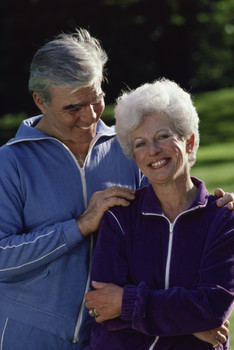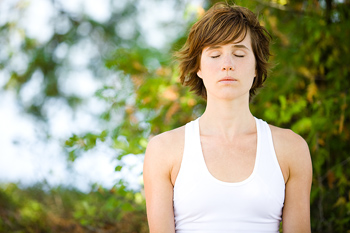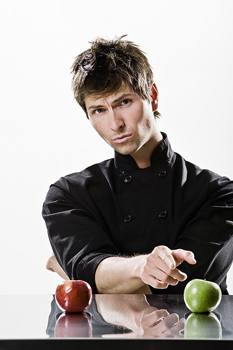Stay Informed
Popular Articles
- Hiatal Hernia: Hidden Cause of Chronic Illness
- Small Intestinal Bacterial Overgrowth (SIBO)
- Applied Lymphology: Unlocking the Secret to Pain Relief
- An Introduction to Constitutional Iridology
- The Low Down on Liver Detoxification
- An Energetic and Emotional Approach to Cancer
- Fat Facts
- Marrow in the Bones
- Blood Type and Nutrition
- Cardiac Herbs: Beyond Hawthorn
Quick Search
The School of Modern Herbal Medicine




My Personal Anti-Aging Program
- 11/1/2008
- Categorized in: General Health
This is page 2 of a two-part article.
 Deep down inside I think most people know what they should be doing to stay healthy and prevent premature aging. They just don't do it because they don't think it's that important. Hence, they don't take these little warning signs seriously. Personally, I'm not content with merely “not being sick.” I want a high level of wellness. I want to have a clear mind, lots of energy, and be free of minor aches and pains. Is that possible? Absolutely, and I'm taking active steps to make this a reality in my life. Here's what I'm doing (revised in 2016 at age 62).
Deep down inside I think most people know what they should be doing to stay healthy and prevent premature aging. They just don't do it because they don't think it's that important. Hence, they don't take these little warning signs seriously. Personally, I'm not content with merely “not being sick.” I want a high level of wellness. I want to have a clear mind, lots of energy, and be free of minor aches and pains. Is that possible? Absolutely, and I'm taking active steps to make this a reality in my life. Here's what I'm doing (revised in 2016 at age 62).
A Check Up From the Neck Up
The first and most important lifestyle change most of us need to make is adjusting our thinking. We all need a frequent “check up from the neck up for stinking thinking.” Many people have seen the DVD, The Secret. The program discusses the power of the mind/body connection, and it is impressive. In short, what we focus our mental attention and emotional energy on will influence our choices and shape our experiences.
So, if we worry that we're going to get diabetes because it “runs in the family,” we more than likely will. If we're convinced that old age will bring lots of chronic health problems requiring extensive medical care, it will. That's why I've chosen to believe that I can live a long and healthy life, but believing means “being and living,” so I've also chosen to act on this belief by working on maintaining a healthy lifestyle.
I'm not saying that genetics doesn't play a role in our health—or that we don't age. But, I think it's the lifestyle and attitudes we “inherit” from our family that do more damage to our health than our genetics. My own parents were active right up to the time they died in their early 80s. And, while they had some health challenges, they both told me how much better off they were with the natural remedies I'd recommended to them than their friends were with all their drug medications.
In fact, my parents were in their late 60s and early 70s in the 1980s when I started working in this industry full time. After I helped them get started on some supplements, both of them saw improvement in their health over the next decade, rather than a decline.
I also believe there is always a mental/emotional component in chronic illness. We are not victims of disease. For example, disease can be an excuse for getting out of an unpleasant situation we lack the courage to get out of on our own. For others, it becomes a way to obtain sympathy and attention. Have you ever noticed that old people who constantly complain about their health problems are less healthy than those with a positive outlook on life?
So, our first task in enjoying a long and healthy life is to reject fear of disease and keep a positive outlook. Remember the secret (the one discussed in The Secret DVD) is that what you focus your mental and emotional energy on will become your reality. It's really a principle of faith. What you hold firmly in your mind and heart will influence your choices and eventually materialize in your life.
The problem with most people is that they don't focus on health. In fact, they don't even think about their health until they get sick, and even then they miss the mark by focusing on "curing" the disease rather than building health. Thus, the focus is never on health, it's always on disease. If you want to be healthy you have to start by picturing yourself as healthy. You need to visualize seeing yourself living a healthy lifestyle and being active, healthy and pain-free as you grow older. I affirm constantly that "I am healthy," and a lot of other similar positive things.
Building health is different than curing disease. It's a completely different mindset because it's focused on the positive outcome of health rather than the fearful activity of trying to avoid or get rid of disease. Even if you've already developed a degenerative disease, focusing on your health will help you heal, whereas focusing on the disease will merely maintain the disease. Also, if you already have a chronic or degenerative disease, it's really important to assess your beliefs and emotional “payoffs” that surround the illness. You may even need some flower essences or emotional healing work to help you move past these issues.
Be a “Picky Eater”
This brings us to the second thing we all need to do if we want to slow the aging process. We need to eat healthy, and to do that we need to become picky eaters. Now, when most of us think of a picky eater, we think of the child who won't eat their fruits and vegetables and only wants junk food. I'm talking about a different kind of picky eater; one who eats the fruits and vegetables and avoids the junk food.
Look, supplements are great, but they are meant to supplement, not replace, a healthy diet. I know you're not a kid anymore, so you don't need or want some parent-figure (like me) hanging over you and telling you to “eat your vegetables.” But, if you shift your attitude about health and then start eating your fruits and vegetables, you will notice your health and vitality returning.
You probably know why fruits and veggies are so healthy, but in case you don't let's review the reasons. Fresh fruits and vegetables are loaded with antioxidants, and antioxidants help reduce inflammation and free radical damage, which in turn slows aging and reduces one's risk of heart disease, cancer, diabetes and so forth. You can, of course, supplement your diet with some antioxidants, but again, that should be in addition to, not instead of, a healthy diet.
Of course, it really helps to avoid refined and processed foods, but here again, if you're thinking about the negative (what you shouldn't be eating) you're making things harder. You want to focus on the positive, i.e., eating stuff you know is healthy for you. That makes the job of improving your diet much easier.
There's another aspect to being a picky eater that I should mention, and that is eating less. According to Barry Sears in The Anti-Aging Diet, there's only one way that is scientifically proven to extend the life of animals in laboratory experiments. You guessed it—limiting food intake. Apparently, one of the biggest sources of oxidative stress comes from processing nutrients. So, if you eat less, you have less oxidative stress. You'll also lose weight, which is another part of the anti-aging equation.
In that arena, I've made some progress. I have tended to be the kind of person who skipped meals and then ate big meals. That's a sure-fire way to gain weight (or at least not be able to lose it). What does work is to eat several small meals. I recently read about a professor at BYU here in Utah who is helping people lose weight by telling them to eat a little bit whenever they are hungry and not worry too much about what they are eating.
The article stated that people whose parents tried to control their eating are more likely to gain weight as adults than parents who didn't fuss over their children's diets. Apparently, it has to do with learning to pay attention to your body and what it wants. When you have parents like mine who warned us to “clean up your plate or no dessert” or “some starving child in China would just love to have that food,” you learn to override your body's messages about hunger and fullness.
The BYU professor said that you should imagine hunger on a scale of 1-10, where 1 is starving to death and 10 is gorging until you can't eat another bite. You want to keep your hunger level around 5. So, whenever you feel just a little bit hungry, you eat a little bit but not enough to make you feel full (just enough to take the edge off the hunger). This sounds like a good practice for longevity as well as weight loss.
 Get Off the Coach, Step Away from the Computer, and Exercise
Get Off the Coach, Step Away from the Computer, and Exercise
Groan! Okay, here's where one of those “check up from the neck up...” sessions proved helpful for me. We know that exercise builds health and helps us feel better. Time and again research shows that regular exercise helps diabetes, helps you lose weight, reduces your risk of cardiovascular disease, relieves depression, etc., etc., etc. So, why is the prospect of exercising such a turn-off for many of us?
For me, it's because the word exercise takes me back to junior high and high school gym classes where an uncoordinated young man experienced a lot of humiliation and stress. The word exercise brings back all those negative feelings, so I tend to avoid exercising to avoid those stressful memories. So, as I've evaluated my own anti-aging plan, I've had to figure how to deal with those emotions in order to get past those memories and exercise.
When I realized that my attitudes from high school interfered with exercising my body, I decided that I needed to get some help. So, I signed up for some coaching at the gym. I knew that I have a stronger need to keep appointments and commitments than my blocks about exercising. That really helped.
My job tends to have me working at a computer a lot, so this has always been a struggle for me, but I keep working on it. Fortunately I have a girl friend who likes to walk and be physically active. This has helped me and encouraged me to stick with it, which brings up an important secret to overcoming mental and emotional blocks and doing what we should. Being accoutable to someone is the best motivator for most of us. It is much stronger than willpower.
Get a Good Night's Sleep
A lot of people start having problems sleeping as they get older, and that's a problem. During deep sleep, your body produces growth hormone from the pituitary (it is also produced during exercise). Growth hormone stimulates tissue repair. So the combination of physical activity and deep sleep is what allows your body to repair itself. That's an important part of the reason why adequate rest and exercise are an essential part of an anti-aging program.
So, if you're having trouble sleeping you need to do something about it. The most common problem I find that disturbs sleep is adrenal fatigue and nervous exhaustion. This can cause a person to feel tired during the day, but toss and turn all night long. Nervous Fatigue Formula or Adrenal Support will often correct this.
It's also important to know that if you suddenly wake up at night and can't go back to sleep, it is a sign of blood sugar problems. What happens is that the blood sugar drops so low the body uses adrenaline to bring it back up. This causes you to suddenly “wake up” as if you were startled and then lie there thinking about your problems. The solution is to become a picky eater and get those refined carbohydrates out of your diet. It also helps to have a high protein, high fat snack (like nut butter or cheese) right before bed. Supplements that stabilize blood sugar levels (like licorice or Super Algae) may also be helpful when taken during the day.
Another thing that can disturb sleep is kidney, bladder and prostate problems. This causes you to wake up in the night needing to urinate. It can be related to adrenal fatigue, in which case Nervous Fatigue Formula can correct it. I've been experimenting with herbal remedies to enhance testosterone, which seem to help my prostate and that has helped me not walk up at night. I've used a product called Steel Libido from Irwin naturals and I've also used AnthroPlex from the InfoWars store. I think doing things to try to increase your testosterone (as a male) also helps with mood, weight and other, more private, things.
If the problem is falling asleep, there are several healthy habits that might help. One is reducing the refined carbs in your diet, another is exercise, and the final one is adopting a set bedtime to help regulate your body's biological clock. Instead of watching TV at night, read or listen to music. If stress is a problem, adaptogens or nervines may help you relax and get to sleep.
If you have trouble getting to sleep but feel groggy and irritable in the morning, you need to “cleanse” your colon and liver. A congested liver will give you nervous energy at night but leave you feeling “hung over” in the morning.
A few years back when I was really struggling with sleep I discovered some new ways to improve sleep. The herb corydalis (a member of the poppy family) is a mild sedative. It has helped me get to sleep when I've been so stressed I couldn't seem to sleep properly. Kava Kava, especially the PharmaKava from HerbPharm, helps me sleep when I'm feeling tense and "wound up" after a difficult day at work.
I've also found that taking Calms Powdered magnesium (a heaping tablespoon) in a quart of water along with a packet of Emerg-n-C vitamin C (about 1000 mg.) helps me sleep more soundly. I put these in a quart of water and drink about half of it before going to bed and refrigerate the rest for the next night.
Even more recently I found a formula called Serenity at the health food store. It's produced by Gaia Herbs and contains skullcap, kava kava and other herbs to help you relax. What's nice about it is that it's a liquid herbal product in a capsule so it works fast, but you don't have to taste it. This stuff really helps “knock me out.”
If none of the above helps, consult a natural health practitioner for additional help and suggestions, but try to avoid sleeping pills as they don't give you a natural night's sleep.
Take Some Anti-Aging Supplements
Now we come to the final part of my anti-aging program. It's an important part of the overall program, but it won't make up for bad lifestyle habits in the other four areas. Because it's hard to get really good food in modern America and because of the high level of pollution, I think some degree of supplementation is appropriate. I adjust what I take regularly, depending on what is happening and how I feel, but here are some of the items I use regularly.
Enzymes. These are vital to good digestion, yet they diminish as we age. I take plant enzyme supplements regularly. I used to take plant enzymes regularly, but found that they weren't working for me as well. I now take Nature's Sunshine's Food Enzymes and their Protein Digestive Aid (an HCl supplement) with meals. I sometimes use Super Papaya Enzyme plus tablets, too.
Fiber. It not only helps keep me regular, it also protects my body against environmental pollutants and cancer. I like NSP's Psyllium Hulls mixed half and half with fresh ground flax seeds, although I haven't been taking it very regularly lately.
Antioxidants. Antioxidants should be an important part of any anti-aging program. Thai-Go is great—I love the stuff. I also take CoQ10 and sometimes MegaChel. I noticed little signs that indicate I could be at risk for cardiovascular disease (such as spider veins around my nose and a tendency to gum disease) so I decided to start protecting myself before I have any serious problems. I've been taking Co-Q10 75 since I turned 50, and I've recently added MegaChel (2-4 per day) instead of a vitamin and mineral supplement. It's something I encouraged my parents do and it worked great for them.
Tonic Herbs. Elderly people the world over have used tonic herbs like ginseng to maintain their health as they age. I adjust what I take depending on how I feel. Right now, I'm on cordyceps for my lungs.
As I stated at the beginning of this article, I don't accept the fact that we're meant to waste away as we get older. Of course, we do have to slow down a bit, but I still think we can enjoy good health as we age by actively working on our health. If you don't have a health-building program, start one today. If you need help, talk to a competent natural health practitioner.


